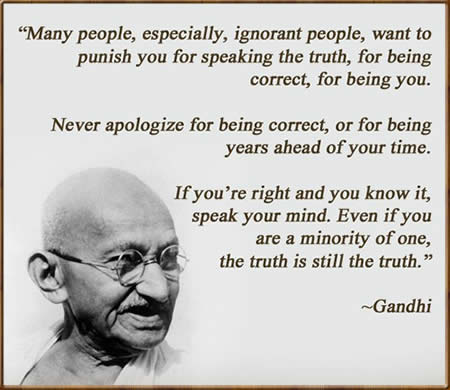Guest Editorial: Truth And Nonviolence
by Arvind Sharma

Gandhi poster courtesy rishikajain.com
Truth and nonviolence are generally considered to be the two key ingredients of Gandhian thought. It is possible to pursue one without the other, possible, for example, to pursue truth without being nonviolent. Nations go to war believing truth is on their side, or that they are on the side of truth. The more sensitive among those who believe truth is on their side insist not that there should be no war but that it should be a just war. The most sensitive, however, and pacifists are among these, avoid violence altogether. But it could be argued that in doing so they have gone too far and have abandoned truth, and even justice. Although he was opposed to war, Gandhi argued that the two parties engaging in it may not stand on the same plane: the cause of one side could be more just than the other, so that even a nonviolent person might wish to extend his or her moral support to one side rather than to the other.
Just as it is possible to pursue truth without being nonviolent, it is also possible to pursue nonviolence without pursuing truth. In fact, it could be proposed that a disjunction between the two runs the risk of cowardice being mistaken for, or masquerading as, nonviolence. The point becomes clear if we take the world “truth” to denote the “right” thing to do in a morally charged situation. Gandhi was fond of quoting the following statement from Confucius: “To know what is right and not to do it is cowardice.”
It is thus possible to pursue both truth without regard to nonviolence, and nonviolence without regard to truth, although one without the other tends to make the exercise of the pursuit of each on its own potentially reckless. The pursuit of truth on its own makes us self-righteous and even capable of killing in its name. Truth runs the risk of turning into absolutism. Similarly, nonviolence pursued on its own, uncoupled with truth, could simply be used to countenance passivity, even cowardice, and degenerate into a form of self-indulgence – just as truth on its own could degenerate into a form of self-righteousness.
If truth and nonviolence (ahimsa) are to be pursued simultaneously, then the question naturally arises, what is the relationship between the two? The following passage by Gandhi might offer a clue:
It is perhaps clear from the foregoing, that without Ahimsa it is not possible to seek and find Truth. Ahimsa and Truth are so intertwined that it is practically impossible to disentangle and separate them. They are like the two sides of a coin, or rather of a smooth unstamped metallic disc. Who can say, which is the obverse, and which is the reverse? Nevertheless ahimsa is the means; Truth is the end . . . Whatever difficulties we encounter, whatever apparent reverses we sustain, we may not give up the quest for Truth which alone is, being God Himself. (M. K. Gandhi, Hindu Dharma, Ahmedabad: Navijivan Publishing House, 1958, p.224-225.)
Thus for Mahatma Gandhi nonviolence is the means, and Truth, or God, is the end. But the relationship of the two is also capable of being looked at from within an essentially Gandhian framework. Suppose that, as a result of the nonviolent search for God (as Truth) one has found God. So far nonviolence was the means and Truth as God the end. But what now? What happens to their relationship once this end has been achieved?
I think it is possible to propose that the relationship between the two continues to hold, although its implication is now altered. In other words, now that God has been found, the question will arise: How do I proclaim the truth about God to the world, violently or nonviolently? It is worth noting that not all those who claim to have realized God have necessarily chosen the nonviolent path. It seems, however, that there are good reasons for arguing, from a Gandhian perspective, that such a proclamation is of necessity nonviolent.
Gandhi insisted that we are an imperfect vehicle for the reception of God’s revelation. This fact means that we could well go wrong in speaking for God. In disseminating God’s message, if we turned out to be wrong but proclaimed it in a nonviolent way, the risk is that we might have caused minimum harm. And if we turn out to be right, then all the more power to us.
EDITOR’S NOTE: Arvind Sharma is the Birks professor of Comparative Religion at McGill University in Montreal. He was the first Infinity Foundation Visiting professor of Indic Studies at Harvard, and has held fellowships at the John F. Kennedy School of Government, the Center for the Study of World Religions, the Brookings Institution, the Center for the Study of Values in Public Life, and the Center for Business and Government. Among his many works he is the author of Gandhi: A Spiritual Biography, New Haven: Yale University Press, 2013. Please consult his website for further information: arvindsharma.org.




